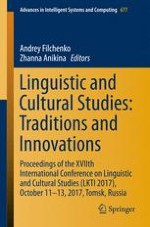This book features contributions to the XVIIth International Conference “Linguistic and Cultural Studies: Traditions and Innovations” (LKTI 2017), providing insights into theory, research, scientific achievements, and best practices in the fields of pedagogics, linguistics, and language teaching and learning with a particular focus on Siberian perspectives and collaborations between academics from other Russian regions.
Covering topics including curriculum development, designing and delivering courses and vocational training, the book is intended for academics working at all levels of education striving to improve educational environments in their context – school, tertiary education and continuous professional development.
